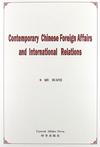当代中国外交与国际关系
出版时间:2013-2 出版社:时事出版社 作者:仇华飞 页数:428 字数:300000
内容概要
The major purpose of this book is to provide an introduction
to contemporary Chinese foreign affairs and international
relations. However, it also provides an overview of Chinese
security environment and current trend of international
politics. The specific content of the book naturally reflects my
own methodological, theoretical, and pedagogical convictions. I
believe that good foreign policy analysis combines the objectives
and the methods of both the scientific and the humanistic
approaches to political analysis. I have given some attention to
normative analysis as well.
This book is the product of a research project conducted under
the auspices of National University research program of Tongji. It
was made possible by the generous financial support of 985 program
of Chinese Ministry of Education. I have benefited from workshops
held at SAIS, the Johns Hopkins University, University of Chicago,
Carnegie Endowment for International Peace and James Baker
Institute of Rice University. I thank for participants in these
workshops for their insightful and helpful comments on the project.
I should also like to express my deep gratitude for the sincere
assistance from Professor Walter Andersen, and Dr. Steve Lewis.
作者简介
仇华飞,江苏宝应人,同济大学政治与国际关系学院副院长、教授、博士生导师,1996年7月毕业于复旦大学历史系世界地区国别史专业,获历史学博士学位。2006年8月至2007年7月美国纽约州立大学政治学系富布莱特高级访问学者,2009年8月至2010年9月先后是美国约翰·霍普金斯大学高级国际问题研究院,芝加哥大学政治系高级研究学者。2012年1月至2月在德国柏林自由大学高级研究学者。2012年8月至2012年9月在美国乔治敦大学、莱斯大学讲学。
2005年以来先后主持国家哲学社会科学基金项目,上海市哲学社会科学规划课题系列项目,上海市浦江计划特殊人才项目,上海市哲学社会科学重大课题,国家哲学社会科学重大委托课题子课题,两次主持并完成上海市教委人文社会科学重点课题。出版学术专著《中美经济关系研究1927-1937》、《早期中美关系研究1784-1844》、《美国的中国学研究》等,在国内外各种学术期刊上发表中英文学术论文90余篇。
书籍目录
Introduction
PART ONE:THE EVOLUTION OF CHINA'S FOREIGN POLICY
Chapter One China and World
Historical Legacy and Worldview
Lean to One Side(1949-1959)
Revolutionary Self-Reliance ( 1960-1969 )
Triangular Diplomacy ( 1970-1989)
Influence of ideology
Chapter Two China's Decision-Making Institutions
Government and Party Organizations
Ministry of Foreign Affairs
Ministry of Foreign Ec:onomic Relations and Trade
Ministry of National Defense
The Decision-Making Process
PART TWO:CHINA'S INDEPENDENT FOREIGN POLICY
Chapter Three Five Principles and
Peaceful Coexistence
The Bandung Conference
Fundamental Norms Guiding International Relations
Chapter Four China and International Organizations
The History of China in International Organizations
China and the United Nations
China's Role in the United Nations
Recent Events with Respect to Taiwan
China and WTO
Chapter Five China's Public Diplomacy
“People to People” Diplomacy
Public Diplomacy and China's Image in the World
The Significance of Public Diplomacy
PART THREE: CHINA AND POWERS
Chapter Six Sino-Soviet Relationslup
Sino-Soviet Split
From Split to Confrontation
Return to Normality
Views for the Sources of Sino-Soviet Conflict
Chapter Seven Sino-Russian Relationship
Sino-Russian Economic Relations
Issues for Sino-Russian Economic Relations
Russian-Chinese Military Cooperation
The Shanghai Cooperation Organization
Outlook on Russia-China Relations
Conclusion
……
PART FOUR: CHINA ON THE GLOBAL SETTINGS
Prospects: China's Position in International Order
Selected Bibliography
Index
List of Abbreviations
章节摘录
版权页: Chapter One China and World Understanding the origins and forces that have shaped China's foreign policy provides a framework in which to view both the changes and the continuities in Chinese foreign policy from 1949.The origins of China's foreign policy can be found in its size and population,historical legacy,worldview,nationalism,and Marxism-Lenimsm-Mao Zedong Thought.In China,Marxism found a similai link between the moral quality of a social class and its rule society.So the propensity of both Confucianism and Marxism to explain and justify policy in terms of historical principles probably contributed to the intellectual appeal of various grand theories of international relations to the leaders of the People's Republic of China.The first generations of PRC leaders have usually felt a need to frame their foreign policies in terms of broad historical epochs and categories.So these various historical schemes were rooted the China's immediate political situation and needs,they also reflected traditional Chinese notions about the appropriate relationship between power and morality.Power had to serve a moral purpose,which was derived from a study of history.The legitimacy of political power in contemporary China is still rooted squarely in interpretations of history,just as it was in traditional China. Three international factors-the foreign policies of the superpowers,the structure of the international system,and China's calculation of its relative power and interests were obviously important but played a relatively minor role during this period.The reasons that domestic factors dominated were the newness of the Chinese revolution and the role of Mao himself. Historical Legacy and Worldview China's long and rich history as the world's oldest continuous civilization has affected Chinese foreign relations in various ways.For centuries the Chinese empire enjoyed basically unchallenged greatness and self-sufficiency.China saw itself as the cultural center of the umverse,a view reflected in the concept of the Middle Kingdom (Zhongguo"中国",the Chinese word for China).For the most part,it viewed non-Chinese peoples as uncivilized barbarians.
编辑推荐
《当代中国外交与国际关系(英文版)》由时事出版社出版。
图书封面
评论、评分、阅读与下载
用户评论 (总计1条)
- 这本书很不错!英文表述地道纯正,既学习了外交与国际关系,又巩固了英语水平。
推荐图书
- 大耳朵爷爷历险记
- 大耳朵爷爷历险记
- 当代西方神学美学思想概览
- 大学生生命教育研究
- 大洋公园的皇帝
- 地.县调调度员培训教材
- 电网防冰避险及安全用电知识读本
- 动物的家-青蛙的家-献给孩子们的科普视觉盛宴
- 动物的家-蝴蝶的家-献给孩子们的科普视觉盛宴
- 动物的家-鱼的家-献给孩子们的科普视觉盛宴
- 动物的家-鸟的家-献给孩子们的科普视觉盛宴
- 电工线路实例详解
- 电击小子诞生-电击小子GO GO GO!
- 儿童运动与休闲活动设计
- 超级战队游戏大全
- 二手车鉴定与评估实用教程
- 定力
- 翻译建构当代中国形象
- 风险社会视阈下的媒介文化研究
- 高职教师自我心理管理实证研究
- 非政府组织与乡镇社会治理研究-野三关的实践与探索
- 服装概论
- 高中生分类作文大全集
- 感恩做人敬业工作
- 高考满分作文大全集
